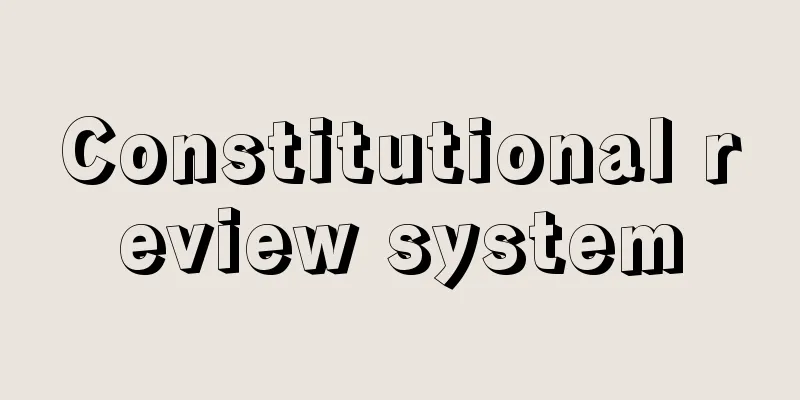Colonialism - English spelling: colonialism

|
A policy or method of control aimed at acquiring, expanding or maintaining colonies, or the ideology that supports it. Colonies can be divided into those aimed at relocating one's own ethnic group and those aimed at placing a different ethnic group under political and economic control. In the modern era, European capitalism has expanded its overseas colonies. The existence of these colonies was an important condition for the development of capitalism. Methods of colonial control included taking advantage of differences in customs and habits, differences in legal awareness, and disparities in political awareness between the people of the colonial power and the indigenous people of the colony, and using violence to suppress resistance by the indigenous people. The word colonialism is also used in the same sense as imperialism. However, while the word imperialism is used in a fixed sense to refer to capitalist countries in the monopoly stage, the word colonialism is used relatively freely to refer to any country that has a colony. However, the word colonialism has come to be used in a negative sense now that the independence of colonies has become commonplace internationally. In 1960, the 15th United Nations General Assembly adopted the "Declaration on the Granting of Independence to Colonial Countries and Peoples," declaring that "the conquest, domination and exploitation of peoples by foreign powers is a denial of fundamental human rights," and condemning colonialism. Thus, colonialism has become an anachronism internationally, but from around this time something called neo-colonialism also became a problem. Neocolonialism is a new form of colonialism adopted by advanced capitalist countries. It is a policy that grants nominal independence to former colonial territories while essentially continuing the old rule, and was particularly prominent in Africa. In other words, while outwardly denying the former colonialism, it seeks to reorganize the relationship of domination and subordination under the pretext of economic aid and other measures. [Takashi Saito] [References] | | | |Source: Shogakukan Encyclopedia Nipponica About Encyclopedia Nipponica Information | Legend |
|
植民地を獲得し、拡大しようとし、あるいは維持しようとする政策あるいは支配の方法、またはそれを支える思想。植民地には、自民族の移住を目的とするものと、異民族を政治的・経済的支配下に置くものという区別がある。近代に入ってヨーロッパ資本主義は海外の植民地を拡大してきた。この植民地の存在が資本主義の発展のための重要な条件であった。植民地支配の方法として、宗主国国民と植民地先住民との風俗習慣の相違、法意識の差違、政治意識の格差などを利用することや、先住民の抵抗に対しては暴力をもって抑えることなどがとられた。 植民地主義ということばは帝国主義と同じような意味でも用いられる。しかし、帝国主義ということばが、独占段階にある資本主義国をさす意味で固定的に用いられるのに対して、植民地主義ということばは、植民地保有国であればどのような国に対しても、比較的に自由に用いられる。しかし、植民地主義ということばは、植民地の独立が国際的に一般的となった現在では、否定的な意味で用いられるようになってきている。 1960年、第15回国連総会は「植民地諸国・諸民族に対する独立付与に関する宣言」を採択し、「外国による人民の征服、支配および搾取は、基本的人権の否認である」ことを宣言し、植民地主義を非難した。こうして植民地主義は国際的にアナクロニズムとなっているが、しかし新植民地主義とよばれるものもこのころから問題となった。 新植民地主義とは、先進資本主義国が植民地主義の新たな形態として採用したものである。これは植民地であった諸地域に名目上の独立を与えながら、実質的に旧来の支配を続けようとする政策であり、とくにアフリカにおいて顕著であった。すなわち、以前の植民地主義を表面的には否定しながら、経済援助などの名目で支配・従属関係を再編成しようとするのである。 [斉藤 孝] [参照項目] | | | |出典 小学館 日本大百科全書(ニッポニカ)日本大百科全書(ニッポニカ)について 情報 | 凡例 |
<<: Colonial Law - Shokuminchiho
Recommend
Evans, B.
…American jazz pianist. At the age of 16, he form...
Uku mine
…There are fishing ports at Nago, Kiyo, and Uda, ...
Huangzhou - Huangzhou
A town in the northwest of North Hwanghae Province...
Emanation
The historical name of radon Rn. In 1899-1900, E....
Aulos - Aulos (English spelling)
An ancient Greek aerophone. A double-reed instrum...
Thursday Island - Thursday Island (English spelling)
A small island located 35km northwest of Cape Yor...
Aloe bainesii (English spelling) Aloe bainesii
…[Hiroshi Yuasa] [Aya Nitta]. … *Some of the term...
Lasioglossum duplex (English spelling)
...The nest consists of a 15-30cm vertical main p...
Allium giganteum - Allium giganteum
...A few leaves usually develop in early spring, ...
Dilute aqua regia
...Also, if you need to react with the sample for...
Seaside platform - seaside platform
A smooth rocky reef that is always below sea leve...
Waltz - Waltz (English spelling)
A dance in three beats at moderate speed, and the...
Ooyasu House
...In this way, merchant ships such as the Ise-bu...
Simpson, George Gaylord
Born June 16, 1902 in Chicago, Illinois Died: Octo...
Lycopods
…Lycopsida (also called Lycopods) is a group of f...









